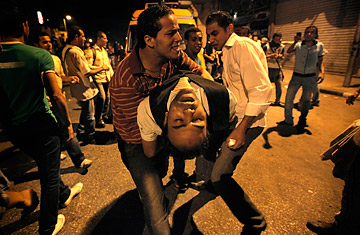
Egyptian protesters evacuate an injured fellow protester toward a waiting ambulance at Tahrir Square in Cairo, Egypt early morning Wednesday, June 29, 2011. Egyptian security forces firing tear gas clashed with protesters in central Cairo late Tuesday.
(2 of 2)
So, when the protestors found themselves in a familiar confrontation with a notoriously brutal police force, they were quick to call for back-up. "When the clashes started, the activists here in the cafes saw it and started tweeting and facebooking and calling everyone to come down," says Mohamed Azazi, a 20-year-old activist and blogger. Many more saw the violence on al-Jazeera, or were passing through Tahrir and stopped to take a look.
"After that, it turned into a fight with protesters throwing rocks at the police and the police throwing tear gas at them," says Hamid Ahmed, a resident of the neighborhood who watched from his window as the scene escalated.
By mid-afternoon on Wednesday the clashes had largely wound down, but only after the country's military leadership tried a trick that the regime had used once before: pull out the police and send in the army, and the people will stop shouting. "It ended a few hours ago when the army came because they respect the army more than the police," said Azazi, standing next to a military police line in the late afternoon.
And indeed, much of the country still appears to feel that way. Polls show Egyptians tilting heavily in the military's favor, even as many protest their pace of reform. And even as a couple thousand Egyptians poured into the square and side streets on Tuesday night to face off against the police, their call remained a minority battle cry. Many late-night Tahrir twitter-users echoed the same question: "Where is everyone?"
Indeed, many Egyptians say they want to see a return to stability and a healthier economy before anything else, and some of the spectators who flocked to see the damage on Wednesday expressed more anger at the protesters than at the security forces. "Around 10 p.m., I saw some thugs come and start throwing rocks at the central security building," says Ahmed. "The police started firing tear gas back to defend themselves, and then the thugs started breaking cars and buildings. They destroyed my cousin's car." Ahmed had been engaged in an argument with a crowd of protesters on that point. "The people here are arguing with me that central security started hitting the protesters first."
Either way, activists are calling for a Day of the Martyrs on July 1, in what may turn out to be this week's Tahrir battle, Round II. And the extent of the damage will depend largely on how the government metes out justice this time around, and indeed whether it shows real commitment to reforming a security system long built around tough treatment, intimidation, and torture.
On Thursday, an Alexandria court is expected to deliver a verdict to the two police officers charged with the murder of Khaled Said, the young man whose death set off a wave of protests that culminated in January's uprising. Whether the officers charged are actually convicted is widely seen as a test for how serious the transitional government is about ending the Mubarak-era tradition of police impunity. An acquittal will certainly add fuel to the next protest promised for Friday.
